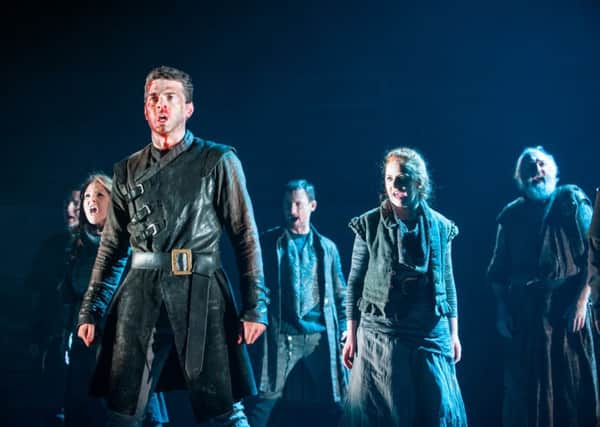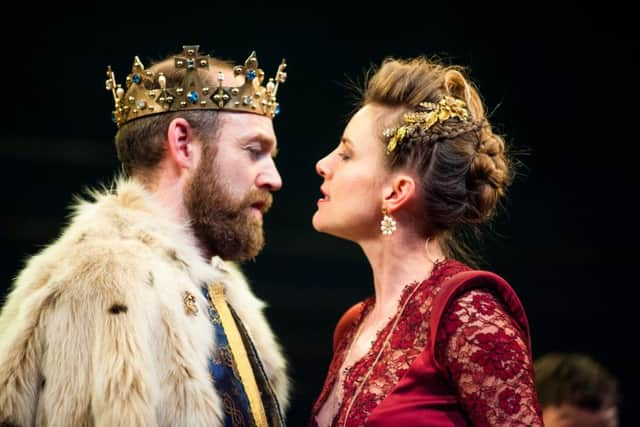A real trilogy of horrible histories comes to Sheffield stage


The last time we saw anything like this was almost exactly a decade ago.
Three plays telling one huge period of history and a theatrical event the likes of which appears to arrive in the region once every ten years.
Advertisement
Hide AdAdvertisement
Hide AdThe last time was Northern Broadsides and the Wars of the Roses Trilogy, when the Halifax company staged all three of Shakespeare’s plays that make up the trilogy, in a single day in 2006.


Now the National Theatre of Scotland and the National Theatre of Great Britain (to give it its official title) have teamed up to bring an equally epic, historic performance to stages around the country.
Following critical acclaim and huge box office success at both the Edinburgh Festival and London’s National Theatre, The James Plays – three plays about James I, II and III of Scotland – will visit the Sheffield Lyceum Theatre this weekend.
While each of the three plays stands alone they are, in truth, designed to be seen together, which is why the three productions are touring the nation and being performed as a trilogy at each venue where they arrive on two days over a weekend.
Advertisement
Hide AdAdvertisement
Hide Ad“It’s an interesting challenge,” says Peter Forbes, who plays Balvenie, a character who appears in the first two of the three James Plays.


“Although it’s huge fun, it is an odd schedule to be playing mainly weekends when it’s full on and then getting a chance to recover during the week. It’s a very different rhythm to what you would normally do when you’re in a play. You have to marshal all your energy for the weekend, but make sure you keep ticking over during the week too.”
First performed in 2014, The James Plays, written by Rona Munro, brought to life the three generations of Stewart kings who ruled Scotland from 1406 to 1488. The three plays are James I: The Key Will Keep the Lock, James II: Day of the Innocents and James III: The True Mirror.
Directed by a former associate at Stephen Joseph Theatre, Laurie Sansom, when the plays premiered at the Edinburgh International Festival, it was to great applause – if for no other reason than the sheer ambition of the undertaking.
Advertisement
Hide AdAdvertisement
Hide AdForbes, one of about half the current cast who were in the play from the first performances, says that first time round, two years ago, there was almost a sense that the triumph would come simply from getting these plays on the stage. “A lot of the focus was around just getting the plays on. We did three huge new plays and while it seemed like we rehearsed them for a long time, the truth is that we only really had a few weeks for each one.
“This time around, for those of us who are coming back to the plays, the half who are returning from the original cast, it’s interesting for us to look at it with a fresh perspective. Whenever you do any play, you always come out of it thinking ‘I wonder if I did that right, or maybe I should have done that differently’, well coming back to it means you can look at that and perhaps try new ideas.”
Although the trilogy are history plays they are written by Munro in modern tongue, what Forbes calls ‘robust colloquialism’. It means the epic sweep of Shakespearean history and drama is told in language that can be easily grasped. “It means you get this interesting interplay between the old and the new. Also, even though it’s big, epic, sweeping stories about history, really it’s about love, death, ambition, revenge.” As the narrator says in Chicago the Musical, ‘all those things we hold dear’.
The other masterstroke in staging these plays the first time round was in the timing. Just ahead of the Scottish referendum, a trilogy that looked at a period of Scottish history in the tumultuous 15th Century couldn’t have been more perfectly timed.
Advertisement
Hide AdAdvertisement
Hide AdThe story of the three generations of Stewart kings is really a story of a country tussling with its past, future and national identity. Forbes says: “As a Scot, albeit living down South for a long time now, it was interesting to be working on the play in the run up to the referendum on Scottish independence.
“The themes of sovereignty and how to work together for the common good were really burning issues when we did the play in Scotland.
“We then took the play to London to the National Theatre after the referendum and people were really feeling the contemporary relevance of the plays. Taking the plays out this time round is fascinating.
“Once again with the coming EU referendum we see people react incredibly viscerally to a story being played out on stage about the themes that are absolutely speaking to what people are experiencing today.”
Advertisement
Hide AdAdvertisement
Hide AdIt’s interesting to hear that there is a real appetite for this theatrical event as it travels the country. It is, there’s no denying, quite a thing to ask an audience to sit through nine hours of history plays, but it would appear that audiences are more than happy to do so – and not just here.
“After it was such a success here we took the show to New York and to New Zealand. Here’s a play that is very much about here, about this country and its history, and people around the world completely relate to it,” says Forbes. “At the end of the trilogy we always seem to get a standing ovation. I think it’s because people really feel like that have gone through this huge experience with the characters – I think that is something you can only do with live theatre: you get people in a room together and tell a story.”